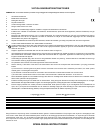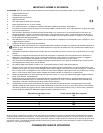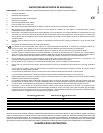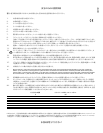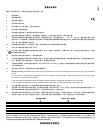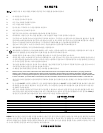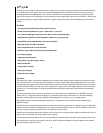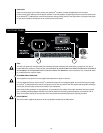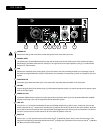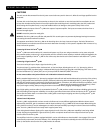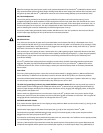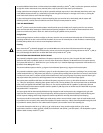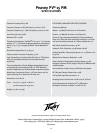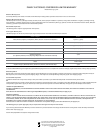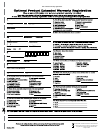
18
OperaTing insTrucTiOns
The unit must be disconnected from the AC power source before any work is done on it. Refer all servicingto qualified service
personnel.
The heat sink on the front plate can become hot to the touch. Do not block or cover the heat sink from ventilation. Be sure
to keep the microphone away from the front of the speaker after switching the mic sensitivity pad to the OUT position and
while setting the microphone level, or very loud feedback will occur! Damage to the system is likely if this occurs!
connect the inputs of the PV
®
15 PM to the output of a power amplifier. The inputs are meant to be driven from a
line-level strength signal.
remove the protective metal grille.
WARNING: The PV
®
15 PM is very efficient and powerful! This sound system can permanently damage hearing! Use extreme
care setting the overall maximum loudness!
The apparent sound level of the PV
®
15 PM can be deceiving due to its clear, clean sound output. The lack of distortion or
obvious distress can make the sound level seem much lower than it actually is. This system is capable of SPL in excess of 119
dB at 1 M from the speaker!
The PV
®
15 PM comes with an 8-foot IEC connection AC power cord. If you are using an extension cord or power strip with
this powered speaker, make sure it is of good quality and of a sufficient current capacity to maintain safety and maximize the
power output capability of the PV
®
15 PM. Do not connect any other device to the same extension cord that the PV
®
15 PM is
connected to.
There are a variety of ways to input a signal to the PV
®
15 PM.
The primary input (5) provides either a balanced mic- or line-level input, allowing the use of a 1/4" phone plug, either a
standard single-ended (tip-sleeve) plug or a balanced TRS (ring-tip-sleeve) type plug OR a male XLR plug. Then there are two
line-level unbalanced 1/4" phone jacks (10 & 11), these provide the LINK OUT/DIRECT IN access.
While a standard single-ended 1/4" phone plug-equipped cable will work well and the balanced input circuitry of the primary
input (5) will provide some interference rejection, a balanced cable using either the balanced TRS 1/4" phone plug or the
XLR plug will provide superior interference rejection and performance. Sometimes, with difficult interference problems, it will
be helpful to lift the shield ground on a balanced cable at the PV
®
15 PM end only by using the ground lift switch (4). Check
any input changes carefully, always turning the volume control down before plugging and unplugging cables.
Use of high quality, premium cables is recommended for the PV
®
15 PM, as these usually have better shielding and materials
and will provide greater long-term reliability. It is usually a good idea to leave some slack at the input to the PV
®
15 PM and
also to tape the cables down or run them under a cable guard to avoid anyone tripping over them or pulling the PV
®
15 PM
over when stand mounted.
The PV
®
15 PM is equipped with a volume control to facilitate use in many different applications. With the volume control
adjusted fully clockwise, gain is at maximum and the input sensitivity is 0.375 V RMS for full-rated output. When driving the
PV
®
15 PM from a mixer, it may be advantageous to reduce the input sensitivity by turning the volume control to the halfway
point. The PV
®
15 PM will now more closely match a typical power amp.
If the mixing board indicates clipping of its output signals, then all of the PV
®
15 PM power capability is not being utilized
cleanly. Clipping the signal before it gets to the PV
®
15 PM is not optimal. Reduce the mixer output level and turn up the
volume control on the PV
®
15 PM.
The amplifiers in the PV
®
15 PM are equipped with DDT
™
and an LED indicator to show that DDT
™
has engaged. If the sound
seems heavily compressed, check this indicator; if it is blinking RED more than occasionally, then the drive level from the
mixer (or the volume control on the PV
®
15 PM) needs to be reduced.



